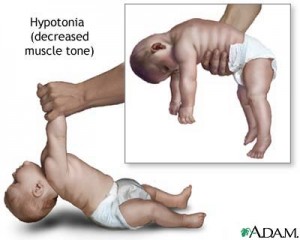What Is It?
Hypotonia is a condition in which the patient has poor or decreased muscle tone. This is not the same as muscle weakness; however, patients with hypotonia often do have weaker muscles. With hypotonia, the brain fails to transmit the proper electrical signals to the muscles that tell them to contract. Hypotonia may be present in varying degrees of severity. It can be caused by a wide range of diseases and conditions, including muscular dystrophy, cerebral palsy, Down syndrome, trauma, and genetic disorders.





